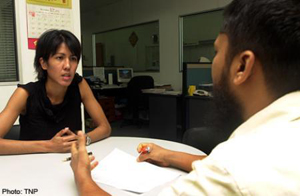The PrEPARE Seminars
PREPARE is a developmental series of Seminars intended to help tertiary students deal with the most fundamental yet unrelenting issues they face in college. Their existence within the university campus is coupled with problems as they transition from their teenage years to adulthood. We deem the campus as a channel to learn the know-hows of the industry, without relegating the virtue of maturity as the core of college education. PREPARE is an acronym of the ten modules designed to meet this goal: Pre-employment Preparation, Pressure Management, Practical Financial Literacy Seminar for College Students, Responsive Work Ethics and Workplace Etiquette for College Students, Raising the Bar in Speech Communication, Enriching Careers after College, Proficiency in the English Language, Attitude Revisited, Reassurance, Acceptance, and Positivity: Addressing College Students’ Low Self-Esteem, and Evaluation for College Freshmen. These ten modules are further discussed below.
Pre-employment Preparation

This module is designed for graduating college students. The Seminar primarily tackles the dos and don’ts when seeking jobs.
Applying for a job nowadays is like hunting an Easter egg. Organizations impose certain levels of difficulty on their hiring process to extract the cream among the applicants, primarily because of stiff competition in the labor market. Pre-employment Preparation discusses topics that equip college graduates with the basics of employment application, and how to maximize their chances of getting hired.
Seminar Duration: 90 minutes
Pressure Management

Pressure can be turned into a positive force in our lives. The right amount of pressure, coupled with the right kind of response, helps to keep us motivated, focused, and effective. But if we fail to manage or control it, we allow pressure to transform into stress, which controls and paralyzes us and infects our productivity.
The Pressure Management Seminar is GuidanceNGO’s response to the increasing clamor for solutions to stress coming from both the student and the worker. The desire to combat stress has yielded little results in overcoming it because of the ABCs (Attitudes, Beliefs, and Concepts) that need to be improved. The Seminar gives clear examples that lead a participant to examine personal issues, such as emotions and work styles, that contribute to stress. Pressure Management is an unconventional and amusing eye-opener and game-changer in the urgent battle against stress.
Seminar Duration: 90 minutes
Practical Financial Literacy Seminar for College Students

The Seminar tackles the wise allocation of money for their finances as students.
Many college students tend to indulge in things that will make them happy at a given moment. They have this YOLO (You Only Live Once) attitude which can lead to overspending and eventually to being broke.
The Seminar discusses the importance of saving money at an early age, the consequences of misusing money, the dos and don’ts in budgeting, and other life hacks in financial management that they need to be familiar with as they break new grounds in pursuing their careers.
Seminar Duration: 90 minutes
Responsive Work Ethics and Workplace Etiquette for College Students

This Seminar module discusses weaknesses that many students are aware of but have not been revealed as possibly having consequential effects in the workplace that could hamper professional growth.
Although the collegiate environment can serve as a training ground in preparing students for the demands of the workplace, some sensitive issues and unmitigated concerns that are usually not addressed should be brought up and discussed to empower the graduate in negotiating ethics in the professional environment.
Seminar Duration: 90 minutes
Raising the Bar in Speech Communication
Undoubtedly, good speaking skills have contributed to demonstrating a favorable impression of a graduate’s alma mater. Faulty speaking skills have turned off would-be employers. Further, the manner by which a speaker communicates is passed on to listeners, and if unchecked, can contribute to the vicious cycle of procreating mistakes.
Raising the Bar in Speech Communication tackles the importance of articulation and ensures that common speaking mistakes are addressed. Since college students are natural marketing magnets that can augment enrollment, they should be equipped with practical speaking techniques to influence prospective enrollees eventually benefitting the institution, and positively affecting other speakers of the English language.
At the end of the module, the attendees become more conscious of their speaking skills and they gain renewed confidence after having acquired speaking techniques not many Filipinos are equipped with. In a nutshell, they begin to sound distinctively impressive.
Seminar Duration: 90 minutes
Enriching Career after College

In a competitive workplace, one must see an undergraduate degree as a stepping stone towards more advanced career-oriented education. This module encourages students to look into post-baccalaureate programs.
Pursuing post-baccalaureate programs and enhancing skills are meant to enrich one’s self-worth and approximate self-security. The module also looks into identifying higher education institutions (HEIs) for various graduate programs based on accreditation, licensure examinations, CHEd centers of excellence and development (CoE/CoD), and evaluates tuition and post-grad requirements. Aside from degree-granting HEIs, the Seminar also discusses special-interest schools offering short-term courses.
Seminar Duration: 90 minutes
Proficiency in the English Language

English is the linguistic engine that drives the global economy. The current importance of the language in the academe and the professional world is just enormous. Competency in the English language is an important ingredient in meeting the demands of industrialized societies.
Mastery of English is a huge advantage for every job hunter, even those who have no plans of going abroad. It used to be the Philippines’ biggest competitive advantage in the global arena. This advantage, however, is being threatened by a growing rivalry with neighboring nations, combined with a perceived decline in English proficiency among our graduates.
The module, intended for college juniors, highlights the advantages of having advanced English communication skills in preparation for employment. Cutting-edge discussions on grammar, usage, voice, and communication in a professional environment complement what the students have learned in their academic English classes.
Seminar Duration: 90 minutes
Attitude Revisited

A student’s attitude towards college life is a strong determinant of how well he or she will do after graduation. Students indulge in new experiences that can either make or break their performance in school.
Attitude Revisited assists college sophomores in increasing their awareness about the dangers of gambling, alcohol, drugs, cyber addiction, and unmitigated romantic relationships, and how indulging in these can negatively affect their pursuit of various careers.
Seminar Duration: 90 minutes
Reassurance, Acceptance, and Positivity: Addressing College Students’ Low Self-Esteem

What limits one’s potentials can be oneself. For some students, before they can surpass peer, family, or society expectations, they should first overcome false standards that modern societies have conjured through the whimsical magic of materialism, prejudice, and self-doubt.
What’s stopping a person from dreaming big? What’s holding the student back from achieving and working towards their dreams?
This Seminar module banks on the realistic sharing of its participants’ woes and experiences. At the end of the Seminar module, participants are expected to be empowered by a reassurance that their concerns are valid, that they are acceptable, that they can be positive, and that they should be freed from the shackles that have been limiting their potentials.
Seminar Duration: 90 minutes
Evaluation for College Freshmen

Changing a college major is not a bad thing to do. There are many stimuli that make students shift majors. For some, it is because they are discontented with their current study. For others, changing a major can be a consequence of a change in the industry’s job climate, or their personal financial situation. These reasons can be legitimate, and students should consider the implications of shifting to another college program.
Common reasons students end up in the wrong major are parental pressure, influence of friends, self-denial, and financial difficulties. Evaluation for College Freshmen is designed to encourage students to re-examine themselves if they are in the right college program. It also fosters the significance of looking into one’s priorities as a major factor in making that final decision of what career to pursue.
